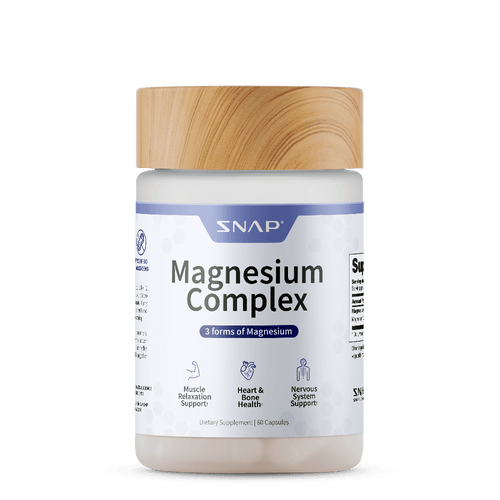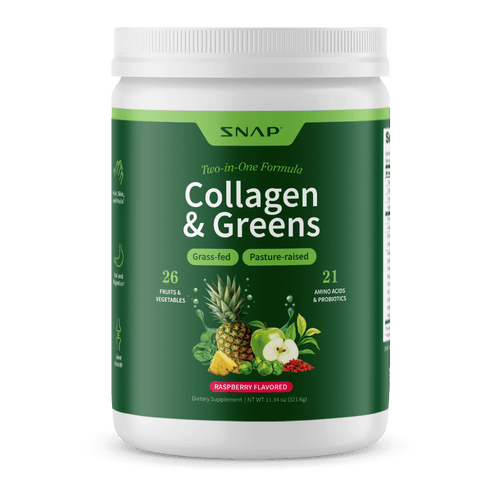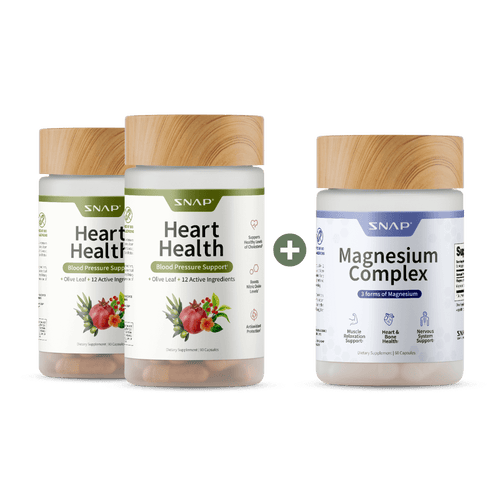Magnesium is an unsung hero when it comes to your overall health, helping with everything from muscle function to immune support.
But did you know that magnesium could also be a powerful ally for your liver?
That’s right!
Studies suggest that magnesium can promote liver health by supporting detoxification processes and reducing the risks associated with liver damage. It's a mineral that’s often overlooked, but it's making waves in the wellness world—especially when it comes to liver function.
So, why not explore how magnesium can support this vital organ?
If you're considering adding magnesium to your routine, look no further than supplements like those offered by Snap Supplements. With a blend of modern science and nature’s finest ingredients, their products are designed to boost your health in ways you might not expect.
In this blog, we will cover:
-
The importance of magnesium for liver health and why it’s essential for detoxification.
-
How magnesium helps with liver function and supports overall wellness.
-
Practical tips on incorporating magnesium into your diet and lifestyle.
Let’s break it down!
$28.00

Complexe de magnésium
$35.00
Magnesium: Overview and Importance
Magnesium is a vital mineral that plays a role in many body functions.
It helps with nerve and muscle activity and supports the immune system. Adequate magnesium levels are essential for maintaining heart health and bone strength.
This mineral supports the production of energy by helping to convert food into fuel. This process is essential for cells to perform their tasks. Magnesium also plays a key role in controlling muscle contractions.
Magnesium helps regulate neurotransmitters, which support mood and reduce stress. It is linked to improvements in memory and learning. By managing stress and promoting calmness, magnesium contributes to overall mental well-being.
Including magnesium-rich foods or supplements in your diet can be beneficial.
Leafy greens, nuts, seeds, and whole grains are excellent sources. Snap Supplements provides high-quality options for those requiring supplements based on modern science and natural ingredients.
Magnesium's benefits extend to maintaining proper blood pressure levels. Studies suggest a correlation between magnesium intake and blood flow, making it crucial for cardiovascular health, health and wellness.
$48.00

Collagène et légumes verts
$60.00
Liver Health Fundamentals
Keeping your liver healthy is essential to your overall well-being.
The liver plays a vital role in digestion, detoxification, and nutrient storage. It processes everything you eat and drink, turning nutrients into energy and removing toxins from your body.
Key Functions of the Liver
-
Detoxification: The liver filters and removes toxins from the blood.
-
Metabolism: It helps break down fats, proteins, and carbohydrates.
-
Storage: Stores vitamins and minerals for future use.
-
Production: Produces essential proteins and cholesterol.
A balanced diet rich in fruits, vegetables, and whole grains supports liver health. Foods high in antioxidants can be especially beneficial.
Foods to Support Liver Health
-
Leafy greens
-
Fatty fish
-
Nuts and seeds
-
Olive oil
Incorporating these foods into your diet can help maintain liver function.
Regular exercise and maintaining a healthy weight also contribute to liver health. Avoid excess alcohol and stay hydrated to prevent liver damage.
Signs of Liver Health Issues
-
Fatigue
-
Yellowing of skin
-
Abdominal pain
If you notice these signs, consult a doctor.
$45.00

Santé et détox du foie
$56.00
Magnesium and Liver Function
Magnesium is essential in various bodily functions, including the liver.
It helps with enzyme activity, which is crucial for liver processes such as detoxification. A proper magnesium level supports overall liver health and aids in the breakdown of toxins.
Magnesium benefits the liver by reducing inflammation. Inflammation can harm liver cells, but magnesium helps keep it under control. This mineral also supports energy production, ensuring the liver has the energy to perform its functions efficiently.
To boost liver function, consider including magnesium-rich foods in your diet. Some examples are leafy greens, nuts, seeds, and whole grains. Taking magnesium supplements can also benefit liver health. They help maintain levels of this essential nutrient, especially if your diet lacks it.
Always consult a healthcare provider before starting any supplement to ensure it is safe and suitable for your needs.
Benefits of Magnesium for Liver Health
Magnesium plays a vital role in liver health.
-
It helps in enzyme reactions and energy production, which are vital for liver function and can help keep the liver working properly.
-
Magnesium is also known to help soothe inflammatory symptoms, which might protect the liver from certain types of damage.
-
Low magnesium levels can be linked to liver diseases. Getting enough magnesium may help prevent and manage liver conditions. Eating magnesium-rich foods or taking supplements can support liver health. Foods like spinach, nuts, and whole grains are good sources.
-
Magnesium is thought to aid in detoxification processes, supporting the liver in flushing out toxins. By maintaining a proper magnesium balance, you may promote a healthier liver.
Including magnesium in your diet can lead to better overall health. The liver is essential for many bodily functions, so keeping it healthy is important.
Sources of Magnesium
Magnesium is an essential mineral found in various foods.
-
Leafy green vegetables like spinach and kale are excellent choices. Nuts and seeds, such as almonds and sunflower seeds, also provide a good amount of magnesium.
-
Whole grains like brown rice and oats also offer magnesium. Including these foods in your meals can help maintain adequate magnesium levels.
-
Beans and lentils are another source of magnesium. Adding them to soups, salads, or stews can boost your intake. They also provide fiber and protein, making them a nutritious choice.
-
Dairy products like yogurt and milk contain magnesium, too. Including them in your diet can support both bone health and magnesium needs. This is especially useful for those who might not get enough from plant-based sources.
Incorporating a variety of these foods into your diet can ensure a steady magnesium intake. When choosing the best sources, always consider your dietary preferences and nutritional needs.
$126.00

Coffret Santé Cœur et Magnésium
$173.00
Recommended Daily Intake of Magnesium
The recommended daily intake of magnesium varies based on age and gender.
Adult men generally need about 400-420 mg per day, while adult women require 310-320 mg. Pregnant women or those breastfeeding might need more, around 350-360 mg daily, to support both their health and the baby’s needs.
Here's a simple table for quick reference:
|
Age Group |
Recommended Daily Intake (mg) |
|
Children 1-3 |
80 |
|
Children 4-8 |
130 |
|
Children 9-13 |
240 |
|
Teen Boys 14-18 |
410 |
|
Teen Girls 14-18 |
360 |
|
Adult Men |
400-420 |
|
Adult Women |
310-320 |
|
Pregnant Women |
350-360 |
Getting enough magnesium is essential for several bodily functions, including muscle relaxation and cognitive health. If you find it hard to meet these requirements through diet alone, consider supplements from trusted brands.
Magnesium Deficiency and Liver Health
Magnesium is crucial for many body processes; your liver is no exception.
It helps with enzyme functions and detoxification, which are vital to keeping the liver healthy. When the body lacks magnesium, liver functions can be disrupted.
A magnesium deficiency can lead to oxidative stress. This can affect liver cells, which need antioxidants to protect against damage. Magnesium helps activate enzymes needed for detoxification.
Consider incorporating magnesium-rich foods into your diet. Almonds, spinach, and black beans are excellent sources. They help maintain healthy magnesium levels to support your liver.
Maintaining magnesium levels is important for your liver. Track your intake to prevent deficiency and effectively support liver health.
Potential Risks and Interactions
When considering magnesium for liver health, it's important to be aware of potential risks and interactions. While magnesium is essential for many bodily functions, too much can cause issues.
Side Effects: Taking high doses of magnesium can lead to diarrhea, nausea, and cramps. These symptoms are more common with supplements than with food sources.
Interactions with Medications:
-
Antibiotics: Magnesium can interfere with certain antibiotics, reducing their effectiveness. If you're on antibiotics, you may need to take magnesium supplements at a different time of day.
-
Diuretics and Heart Medications: These can increase magnesium levels in the body, potentially leading to toxicity if combined with magnesium supplements.
It's always best to consult your healthcare provider before starting any new supplement. This is especially important if you have existing health conditions or take multiple medications.
Prevention of Overdose:
-
Stick to the recommended daily allowance (RDA) unless advised otherwise by a doctor.
-
Be especially cautious if you are pregnant or nursing, as your needs might differ.
Keeping informed and cautious ensures you get the benefits of magnesium without unwanted complications.
Studies and Research Findings
Magnesium plays an important role in your body’s functions and may impact liver health. Some research suggests that magnesium can support liver function by aiding in metabolic processes and reducing oxidative stress, which is key for maintaining a healthy liver.
Oxidative stress is linked to liver damage and diseases. Antioxidants like magnesium may help combat this stress. While research is ongoing, studies have highlighted the potential benefits of magnesium in liver support.
In some studies, magnesium intake has been associated with improved liver enzyme levels. This association suggests a potential protective effect on the liver. Including magnesium in your diet through foods or supplements like those from Snap Supplements is beneficial.
Always consult with a healthcare provider before starting any new supplement regimen. It's crucial to ensure that adding supplements will be safe and beneficial for your specific health needs.
Magnesium Supplementation Protocols
When considering magnesium supplements, it's important to understand the dosage and form.
-
Magnesium oxide, magnesium citrate, and magnesium glycinate are popular choices. Each has different absorption rates and bioavailability. These forms might be beneficial for liver health. Magnesium is known for supporting cellular functions and energy production in the liver.
-
A typical magnesium supplement dosage ranges between 200 and 400 mg per day. Always check with a healthcare provider before starting, especially if you have pre-existing conditions.
-
Timing is another factor in magnesium supplementation. Taking it with meals can help improve absorption and reduce stomach upset. Taking magnesium in the evening may be beneficial in some cases, especially when dealing with sleep issues. With supplements, start with a lower dose to see how your body responds. Adjust according to your healthcare provider's guidance.
Dietary Considerations and Healthy Practices
When supporting liver health, your diet plays a vital role.
-
Foods rich in antioxidants, like green leafy vegetables, can help protect the liver from damage. Consider adding items like broccoli, spinach, and kale to your meals. These foods help detoxify the body and improve liver function.
-
Consider including magnesium-rich foods in your diet. Nuts, seeds, and whole grains contain magnesium, contributing to numerous bodily functions, including liver health. Eating magnesium-rich foods supports your body's natural detoxification processes.
-
Hydration is crucial. Drinking plenty of water aids in flushing out toxins, lightening the liver's workload. Aim to drink at least eight glasses of water each day. Herbal teas, such as milk thistle, are also good choices for liver support.
-
Maintaining a balanced diet with various nutrients is essential for liver health. Fats play a role, too, but focus on healthy sources. Opt for avocados, nuts, and olive oil, which provide healthy fats without overburdening your liver.
-
Lastly, moderating your processed foods and sugar intake can significantly benefit liver health. If consumed in excess, these items can lead to fatty liver disease. Making conscious choices supports not only your liver but your entire well-being.
Frequently Asked Questions
Magnesium is often celebrated for its health benefits, but how exactly does it impact liver health? Let’s take a look at some common questions people ask about magnesium’s role in supporting liver function and overall wellness.
Does magnesium help in detoxifying the liver?
Magnesium may support liver detoxification by assisting in the removal of toxins. The mineral can also aid in maintaining normal liver function, playing a part in processes that remove waste from the body.
What form of magnesium is most beneficial for liver health?
There are several forms of magnesium, with magnesium citrate and magnesium glycinate often recommended for their high absorbability. When included as part of a balanced diet or supplement regimen like Snap Supplements, these forms may benefit liver health.
How does magnesium interact with conditions like fatty liver disease?
Magnesium might help manage fatty liver disease by regulating metabolic processes. It can also potentially improve insulin sensitivity, which is beneficial for patients with this condition.
Are there any risks associated with taking magnesium supplements for liver function?
While magnesium is generally safe, excessive intake can lead to adverse effects such as diarrhea or digestive discomfort. It is important to follow recommended dosages and consult with a healthcare provider.
How can magnesium contribute to the repair of liver damage?
Magnesium can support cell repair and regeneration, crucial in healing liver damage. Its role in protein synthesis and enzyme activation helps maintain healthy liver cells.
What precautions should be taken when considering magnesium for patients with liver disease?
Patients with existing liver conditions should consult a healthcare professional before starting magnesium supplements. A careful assessment can ensure that the supplement is safe and beneficial, aligning with the health goals provided by options like Snap Supplements.